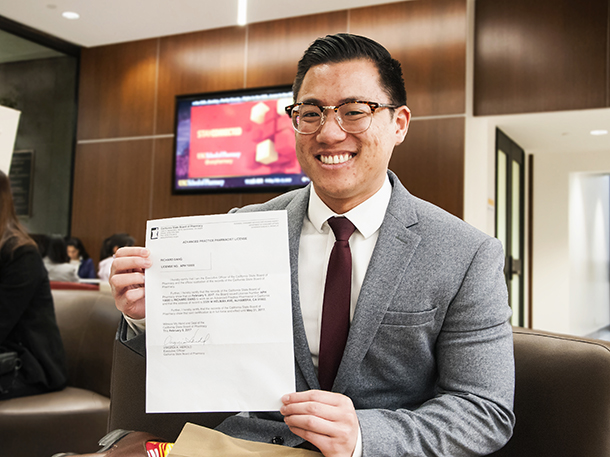Richard Dang, PharmD, assistant professor of clinical pharmacy at the USC School of Pharmacy, recently became the first pharmacist in California to receive an advanced practice pharmacist license. The State Board of Pharmacy established the licensure, made possible by Senate Bill 493, at the end of 2016.
Pharmacists are eligible to earn an advanced practice pharmacist license by meeting two of the following three criteria: (1) finishing a residency training program; (2) providing at least 1,500 hours of direct patient care services; and (3) earning certification or completing an advanced practice pharmacist certificate training program.
“Pharmacists in California have been providing advanced clinical services for decades in licensed healthcare facilities,” said Associate Dean for Clinical Affairs Steve Chen, PharmD, who also is the William A. and Josephine A. Heeres Chair in Community Pharmacy. “The difference now is that licensed advanced practice pharmacists can provide these services in pharmacies and settings outside of traditional healthcare facilities, making these services more widely available to patients who need them. This is a breakthrough. With pharmacies in every neighborhood, patients will have easier access to the valuable services of pharmacists.”
Upon earning licensure, Dang and his fellow practitioners may perform patient assessments; order and interpret drug-therapy-related tests needed to maximize treatment; participate in the evaluation and management of diseases and health conditions in collaboration with other healthcare providers; and initiate, adjust or discontinue drug therapy for patients after notifying the diagnosing prescriber within or outside of licensed pharmacies.
“I authored SB 493 so that the healthcare system can make better use of highly trained providers to improve the quality and delivery of healthcare for California patients,” said state Sen. Ed Hernandez, OD, who shepherded the bill through the legislature with key support from the school’s faculty. “With the new advanced practice licensure, pharmacists will bring greater education and access to services for patients,” he added.
California’s advanced practice pharmacist certification allows pharmacists to provide crucial services in community-based settings that have traditionally been limited to hospitals and clinics.
“There’s a lot of potential to make a difference and help others see pharmacists in a different light,” said Dang, who helped develop the Advanced Practice Pharmacist Certificate Training Program with the California Pharmacists Association and the National Association of Chain Drug Stores.
“Community-based pharmacists are on the frontline and readily accessible, so it makes sense to be able to provide this kind of care where patients live, work and play,” Dang said. “As more pharmacists become engaged in advanced pharmacy practices, more patients will have access to pharmacists as a part of their health care team. When pharmacists are a part of the health care team, patient outcomes are improved and health care costs are reduced.”
The state board awarded seven licenses in early February and is still reviewing more than 40 applications. The USC School of Pharmacy also played an important part in administering the training. Its live seminar portion — which consists of five modules reviewing patient assessment, ordering and interpreting drug-therapy-related tests, patient referral, drug therapy management and documentation — was delivered at the school to one of the initial groups of applicants.
In addition to his other duties, Dang serves as director of Student Outreach for Community Health and site coordinator for the USC Community-Based Pharmacy Residency Program.
“It’s a huge step forward,” said Professor of Clinical Pharmacy Mel Baron, PharmD, of Dang’s new license. “He’s a fabulous role model for young graduates. Advanced practice pharmacists are leading the profession. This is the future of pharmacy.”
— Michele Keller


